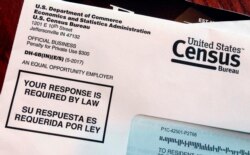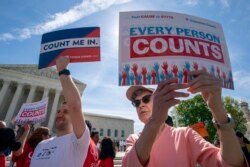Story updated July 11, 2019, 8:20 p.m.
WHITE HOUSE — U.S. President Donald Trump says he is issuing an executive order for the Commerce Department to obtain citizenship data. But he is abandoning trying to add a controversial question on citizenship in the country's once-a-decade census next year.
"As a result of today's executive order we will be able to ensure the 2020 census generates an accurate count of how many citizens, non-citizens and illegal aliens are in the United States of America," Trump said, flanked by Attorney General William Barr and Commerce Secretary Wilbur Ross, in the White House Rose Garden.
"We are not backing down on our effort to determine the citizenship status of the United States population," added Trump.
The president announced that federal agencies are to provide Commerce with all relevant data that can be used to tabulate both citizens and noncitizens in the United States.
"It will be, we think, far more accurate," Trump said.
The action comes in wake of an injunction preventing the citizenship query on the ballot after the Supreme Court called "contrived" the administration's argument that the question was essential to support the Voting Rights Act.
"Any new decision would be subject to immediate challenge" if the administration continued to fight in three federal court cases to get the citizenship question on the 2020 census, explained Barr.
"Trump's attempt to weaponize the census ends not with a bang but a whimper," remarks Dale Ho, director of the Voting Rights Project of the American Civil Liberties Union.
"He lost in the Supreme Court, which saw through his lie about needing the question for the Voting Rights Act," says Ho, who argued the case in the high court. "It is clear he simply wanted to sow fear in immigrant communities and turbocharge Republican gerrymandering efforts by diluting the political influence of Latino communities."
House Speaker Nancy Pelosi, earlier on Thursday, said the full chamber is to vote on a resolution of criminal contempt against Barr and Ross (whose agency oversees the Census Bureau) "so it can enforce our subpoenas and get the facts" regarding the Trump administration's intent with the citizenship question.
According to Eric Yellin, an associate professor of history at the University of Richmond, "the census isn't actually supposed to be used for demographic data collection such as citizenship" to determine representation and resource allocation, including taxation. "It is critical that we know how many people, regardless of citizenship, reside in the U.S. and in which specific localities."
A Harvard-Harris Poll late last month shows that Trump had political support for the action; the survey of registered voters showing Americans by a 2-to-1 margin favor asking about citizenship on next year's census form.
"I wonder how many Americans know that the Constitution specifies persons' and that citizenship data is already collected in other surveys, Yellin at the University of Richmond tells VOA in response to the survey results.
The head count of more than 327 million people in the United States is set to start next April.
In the United States it is an important exercise, determining the state-by-state allocation of the 435 seats in the House of Representatives based on population and the distribution of hundreds of billions of dollars in federal aid to the states.
Opposition Democrats and immigrant groups consistently attacked Trump's effort to add the question.
Demographers, including at the government's Census Bureau, feared non-citizen immigrants in the United States would not fill out the census forms out of fear of identifying themselves as being in the country without documentation and opening themselves up to deportation.
Democrats say if immigrants are undercounted, seats in the House and federal aid to the states could be redistributed away from Democratic-led cities where immigrants often live to whiter communities where Republicans often reside.
The Justice Department, which has been handling the court fight over the citizenship question, attempted this week to switch out its entire team of lawyers, after some attorneys balked at continuing their work on the court case following the Supreme Court ruling.But two federal judges rejected the switch in the government's legal team, saying it could not do so without satisfactorily explaining why.









